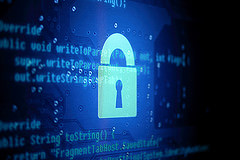

Photo by Yuri Samoilov is licensed under CC BY 2.0
How many times have you checked your phone for messages today? How many e-mails have you read in the last few hours? These are common occurrences – the norm for most of us. We are almost totally dependent on the technology that keeps us connected.
We may worry about many things…but, the security of our personal devices is not high on our list of concerns. Well, perhaps it is if the media has just reported on the breach of a retail or banking network system that we frequent.
Our concern about Internet security could change soon. Taxpayers are beginning to realize that public networks, if hacked, cause dangerous chaos and/or significant financial pain.
Local governments are especially susceptible to technology threats. Cities now operate parking meters, traffic cameras, road and water sensors and all kinds of financial transactions via the Internet. And, as smart technology becomes more prevalent, the danger of outside risk increases.
In 2009, hackers breached city networks in San Francisco and were able to access a network for newly implemented smart parking meters. In just three days, the hackers altered the system so that it allowed them to park free anywhere. By the time officials found the breach, an abundance of revenue had been lost and the system was in total disrepair.
In 2014, scientists at the University of Michigan were asked to perform hacking tests on wireless traffic signals. They were successful in a short amount of time and reported that it was not even a hard test. The exercise proved that real hackers could disrupt the systems and do a tremendous amount of damage that would likely result in accidents, injuries and death.
As cities monitor utility meters via the Internet (more than 40 percent of municipal utilities will do this within the next three years), that threat will be tied to fraud. Hackers could alter billing, move facilities off the network or disrupt service completely. The FBI warns that security hacks to smart meters could cost utility companies as much as $400 million per year. That would definitely impact local taxpayers.
A 12-year-old boy who was able to hack into multiple government and police Web sites brought down servers, defaced text and accessed user information. Damage was estimated to be about $60,000. It’s a little frightening to realize how adept young students are when it comes to technology.
Another 15-year-old hacker was able to cause a 21-day shutdown of NASA computers that support the international space station. He accessed a Pentagon weapons computer system and was able to intercept 3,300 e-mails and steal passwords.
Network security is a big problem for public officials. Local mayors, council members and other public officials are obviously reaching out for help from private-sector experts. Most hackers realize that local governmental entities have less sophisticated systems as well as inferior security protection. Once a hacker gains entry to any system, there is a possibility of working up the chain to more critical networks.
The continual implementation of new technologies shows no signs of slowing down. And, neither can the country’s security efforts. In March, the Federal Trade Commission (FTC) announced the formation of a new office: the Office of Technology Research and Investigation (ORTI). This will be a place where public officials can get assistance and guidance about network security. At a time when almost 5 billion connected devices are in use, the formation of such an office is certainly justified.
Next time you see a public official, it would be good to offer a bit of encouragement. Their responsibilities – in so many areas – are changing at the speed of light.
